Share
Working at ESO
Are you interested in working in areas of frontline technology and in a stimulating international environment? Do you feel your profile matches our requirements? Learn more about our current vacancies and apply online. Read more..
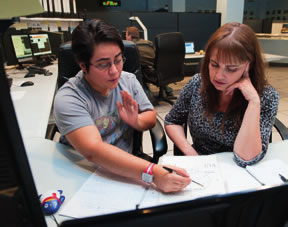
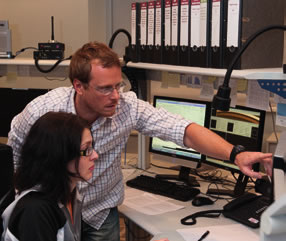

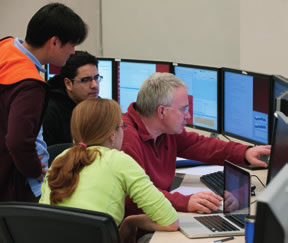

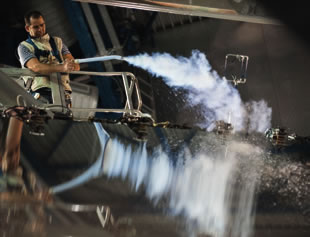
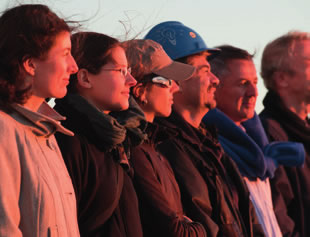
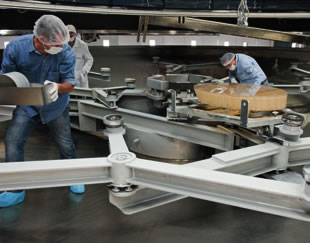
The Atacama Large Millimeter/submillimeter Array (ALMA), an international astronomy facility, is a partnership of the European Organisation for Astronomical Research in the Southern Hemisphere (ESO), the U.S. National Science Foundation (NSF) and the National Institutes of Natural Sciences (NINS) of Japan in cooperation with the Republic of Chile. ALMA is funded by ESO on behalf of its Member States, by NSF in cooperation with the National Research Council of Canada (NRC) and the Ministry of Science and Technology (MOST) in Taiwan and by NINS in cooperation with the Academia Sinica (AS) in Taiwan and the Korea Astronomy and Space Science Institute (KASI).
ALMA construction and operations are led by ESO on behalf of its Member States; by the National Radio Astronomy Observatory (NRAO), managed by Associated Universities, Inc. (AUI), on behalf of North America; and by the National Astronomical Observatory of Japan (NAOJ) on behalf of East Asia. The Joint ALMA Observatory (JAO) provides the unified leadership and management of the construction, commissioning and operation of ALMA.
The Joint ALMA Observatory invites applications for the position of:
Observatory System Engineer
Santiago
Deadline 22/04/2019
The Joint ALMA Observatory (JAO) is seeking an experienced engineer to provide strategic, technical guidance to ALMA, specifically aspects of the ALMA Development Program and other Observatory improvements, system engineering for the long-term health of the observatory and its assets, and problem investigation for issues spanning a broad range of technical areas of ALMA. This is an outstanding opportunity to lead the technical development and health of the most ambitious ground-based observatory operational in the world today.
The Observatory System Engineer is responsible for the strategic guidance of ALMA system engineering from development and improvements to system health/performance. The Observatory System Engineer will report to the ALMA Deputy Director and will be a member of the JAO's Core Management Team where it is expected that he/she will make key contributions to the strategic planning, policy development and implementation, as well as the overall decision-making at the JAO, ensuring that these include the proper consideration of the long-term technical viability of the Observatory and allow for development of the Observatory's capabilities.
The ALMA observatory is fully operational, with all 66 antennas dedicated to science. The continued development and operation of the array requires careful attention, investigation, and planning on the part of the Observatory System Engineer in collaboration with others at the JAO and the Executives (ESO, AUI/NRAO, NAOJ). Specifically, a dedicated ALMA development funding line allows new capabilities and instrumentation, maintaining ALMA's position as a cutting edge astronomical facility. The Observatory System Engineer is central to this development program, providing leadership in updated requirements, assessment of the performance of potential upgrade options, and will lead the system-level assessment of the potential impacts, culminating in a verification plan, of any proposed development idea.
The Observatory System Engineer also plays a critical role ALMA-wide, participating in the Integrated Engineering Team and coordinating System Engineering activities throughout the ALMA regions. The Observatory System Engineer will, in coordination with technical teams in the regions, interact with the technical communities world-wide in effort to further ALMA's technical capabilities.
Responsibilities:
1. Ensure engineering integrity, quality, maintenance methodologies, and development of the array in regards to system engineering. 2. Lead technical evaluation of upgrades to the Observatory, including both basic improvements and major developments, based on analyses of the system level performance. This includes review of proposals and their subsequent implementation. 3. Assure maintenance to a high level of all assets for the life of the Observatory by means of, for example, defining and updating corrective maintenance processes and advocating for effective preventive maintenance. 4. Lead investigation of system-level and intractable faults. 5. Coordinate the implementation of multi-region and/or multi-discipline development projects. 6. Develop and maintain the system verification procedures. 7. Develop and maintain the system performance budgets as well as simulation tools for the same.
Requirements/Qualifications:
Applicants for this position should fulfill the following requirements:
1. University degree in Physics or Engineering or equivalent demonstrable work experience 2. At least five years of relevant field engineering experience in a large research and/or high technology project; 3. Proven experience working with formal system engineering processes, including performance verification, error budget development or use, as well as model development and use; 4. Creative thinking and problem-solving skills; 5. Familiarity with techniques used in single dish and interferometer radio observatories, in addition to radio frequency techniques in the mm/submm range; 6. Strong ability to lead, mentor, and evaluate local and international staff with a diverse cultural background; 7. Excellent interpersonal and communication skills; fluency in English (oral and written) is essential; knowledge of Spanish is an asset. 8. Due to travel requirements and work at high altitudes, a successful high altitude medical check is a necessary condition of employment for this position.
Duty Station / Location of Position:
The duty station is the Santiago Office with frequent ('30%) travel to the ALMA operations site near San Pedro de Atacama: the Operations Support Facility (OSF) at 2900 m and the Array Operations Site (AOS) located on the nearby Llano de Chajnantor at 5000 m altitude. Occasional international travel may be required as well.
Starting Date:
As soon as possible.
Contract:
The successful candidate may request contract offers from any or all of ESO, AUI/NRAO or NAOJ. The selected candidate will be assigned to the Observatory System Engineer position at the JAO for an initial period of three years with mutual options for renewal thereafter; however, actual contractual terms will be revised accordingly by the relevant employer (ESO, AUI/NRAO or NAOJ).
Remuneration:
The remuneration will be revised between the selected candidate and the employing Executive, according to the relevant rules and regulations. Furthermore, if applicable, an expatriation allowance as well as some other allowances will be added.
How to apply:
Qualified applicants with extensive relevant experience are invited to apply by submitting an application to one of the ALMA Executives. Each application should be written in English and must include:
- Motivational cover letter;
- Curriculum Vitae;
- Three reference letters.
Applicants submitting their application to ESO are invited to apply online at http://recruitment.eso.org/. Reference letters should be sent to vacchile@eso.org.
Applicants submitting their application to AUI/NRAO are invited to apply online at http://jobs.jobvite.com/nrao/jobs. Reference letters should be sent to Candice Waller at cwaller@nrao.edu.
Applicants submitting their application to NAOJ are invited to send their application and reference letters to apply-alma-ObsSystemEngineer2019@nao.ac.jp
For further information please consult (www.almaobservatory.org), as well as the ESO, NRAO, and/or NAOJ Home Pages (www.eso.org), (www.nrao.edu), or www.nao.ac.jp/en/ )
ESO, NRAO, and NAOJ are Equal Opportunity Employers. The post is equally open to suitably qualified female and male applicants.
The initial deadline for receipt of applications to be considered for the position is 8 April, 2019. However, applications will continue to be accepted until the position is filled.
